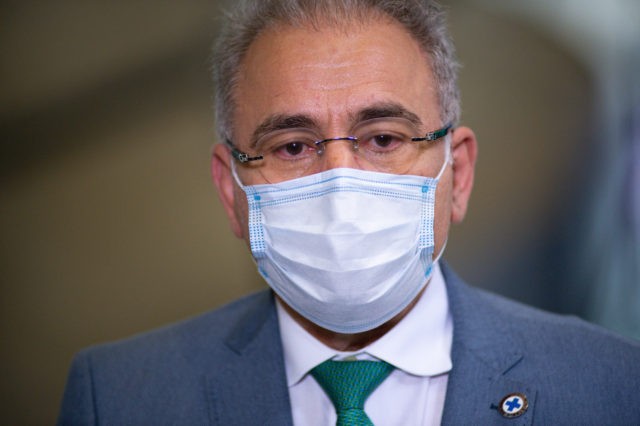Brazil’s Health Ministry on Thursday urged states across the country to stop administering Chinese coronavirus vaccines to healthy adolescents aged 12-17 years old, citing an ongoing investigation into the recent death of a teenager in São Paulo state after she received the Pfizer coronavirus vaccine.
“For now, as a matter of caution, we have adverse events to be investigated. We have these children and teenagers who took these vaccines that were not recommended for them,” Brazilian Health Minister Marcelo Queiroga said at a press conference on September 16.
Queiroga referred to adolescents without comorbidities, who do not face a significant risk of serious symptoms or death should they contract the Chinese coronavirus.
Brazil’s health minister Thursday instructed healthy Brazilians between the ages of 12 and 17 years old not to receive a second dose of a Chinese coronavirus vaccine if they had already been administered a first dose, citing a lack of evidence about the efficacy of such vaccines for youth without comorbidities.
Queiroga said Brazil’s Health Ministry was awaiting the results of an ongoing investigation into the death of a 16-year-old female adolescent in the city of São Bernardo do Campo after learning of her demise on September 15.
“So far, it is not possible to know if the death of the teenager, who was vaccinated with Pfizer/BioNTech, is directly related to the vaccine or if she had any risk factors,” the health minister said. “This fact will be investigated in detail by state surveillance teams and the Ministry of Health.”
“In total, 1,545 adverse effects after vaccination have been reported in adolescents so far, which may or may not be related to the vaccine,” he revealed.
Queiroga cited recommendations against administering Chinese coronavirus vaccines to healthy adolescents by both the U.K. vaccine advisory body and the World Health Organization (W.H.O.) as factors supporting the Brazilian Health Ministry’s decision on Thursday to halt youth vaccinations.
“In the UK, the Joint Committee on Vaccination and Immunization (JCVI) decided not to recommend vaccinating adolescents without comorbidities in early September,” Queiroga noted on September 16.
“The decision was based on post-vaccination adverse effects and an analysis of a rare side effect, an inflammation of the heart called myocarditis. Health authorities are also investigating the cases,” he explained.
Brazil’s federal Health Ministry on Thursday accused individual states of hastily administering Chinese coronavirus vaccines to youth without comorbidities before a previously scheduled start date of September 15, which was established by the national government.
“[C]ontrary to the recommendation of the [Health Ministry], about 3.5 million adolescents have already been vaccinated with at least one dose in the country, according to data from the LocalizaSUS platform,” Queiroga observed on September 16.
“There are also records of vaccination with other immunizing agents not recommended by Anvisa for this age group, such as Astrazeneca, Janssen and Coronavac,” he revealed. Anvisa is the Portuguese acronym for the Brazilian Health Regulatory Agency.
“For these adolescents without comorbidities, who have already taken the first dose of the vaccine, the Ministry of Health does not recommend completing the vaccination cycle with the second dose, until new scientific evidence emerges,” Queiroga advised.
Sao Paulo state Gov. Joao Doria issued a statement via social media on September 16 vowing to defy the federal Health Ministry’s recommendation to halt youth vaccinations. He insisted that Sao Paulo “would not stop vaccinating adolescents,” according to Reuters.

COMMENTS
Please let us know if you're having issues with commenting.